Written by: Sara Penilla Montoya, Promotora and Protégete Intern
Too often, the youngest members of our society are left without a seat at the decision-making table.
We’ve been told that we are “too young,” “not educated enough,” or “not mature enough” to understand the issues that we see everyday in our schools, our neighborhoods, and our homes. We’re discouraged from actively engaging in our communities, stifling our collective voice and the positive changes that we want to make to improve our future.
That still hasn’t stopped today’s generation from standing up together, raising our voices, and declaring how significant it is to be a part of change.
The environmental movement is the perfect example to show how children, teens, and youth — the people that will wrestle with climate impacts for generations to come — are stepping up to defend their future. The conservation movement poses an immense opportunity for young people, especially for people from frontline communities, to express the need for powerful climate leadership — and that’s why I was so excited to attend the Rising Leaders training in Washington, DC.
At the League of Conservation Voters training, students from all over the country learned more about the most pressing environmental issues affecting our communities and how storytelling can be a tool to lobby decision-makers at the state and federal levels.
Four students from the Protégete team experienced firsthand the importance and power our personal stories hold as we lobbied with members of Congress from Colorado. For some students, the trip was their first visit to our country’s capital.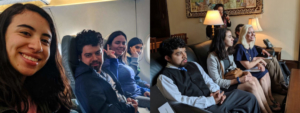
We took the chance to talk to elected officials about the issues that are not only impacting our lives, but the livelihoods of millions of Americans. The stories shared a common message: it’s time for climate action, for us, our environment, and future generations.
Xioana, 16: Protecting Future Generations
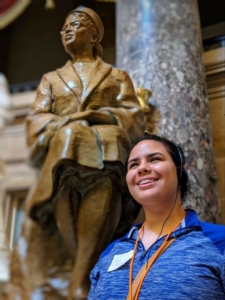
Xioana stands with a statue of Rosa Parks, the only statue of a woman of color in the Capitol.
“When I was 13 years old, my family and I made the move from Caracas, Venezuela, to Denver, Colorado. My country has historically been lauded the most prosperous in South America; we had a booming economy that enticed immigration from around the world, and we welcomed everyone. That is, until political corruption changed everything.
My family saw firsthand how economic unrest had unimaginable ramifications on every aspect of peoples’ lives, including great environmental justice implications. My grandfather not only struggled for financial stability, but for access to water. He can barely afford to take just a few showers a year, due to drought exacerbated by climate change.
I remember my first day of school [in the United States]. I was walking through the hallways, fascinated by the fact that I had a locker, that breakfast was free, and that people gave away pencils. I realized that the opportunities I craved for so long were finally within my reach.
Too often, we waste our potential and decrease our value in the eyes of society; but the beauty of our ephemeral existence is that if we realize it soon enough, we can learn to appreciate the little things.
I come from a place where corruption is abundant while food, water, and electricity are insufficient. While spending thirteen years of my life in this place, I never realized how much I was being deprived, because it is easy to be satisfied with what you have when you have never known any better. In my young eyes, America’s only great value was that it snowed every now and then. I never imagined this to be the place of freedom and opportunities. The place that I come from is falling apart as I write this and losing its values as you read it. The reality is that while some people can escape this fate, others cannot. I was one of the lucky ones.
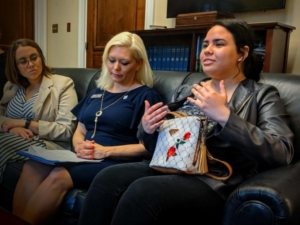
Xioana shares her story with Congresswoman Diana DeGette.
Since moving to Thornton, I have felt very fortunate that these difficulties are not an everyday reality for me and my mother. It’s why I want to join the Air Force when I graduate high school; I love this country, it’s my home and I want to keep it safe. But I need my politicians to keep me safe, too. I live right on the outskirts of Commerce City, a municipality that is known for its high concentration of industries and hardworking communities of color. These factories, including a refinery located a mere five miles from my house, cause profound health impacts on the children growing up near them.
I went to Washington D.C. to tell our members of Congress that I am the future of this country and they need to protect me.”
I am young, an immigrant, Latina, and powerful. I am the face of the United States, and I believe everyone deserves a healthy environment.
Eunice, 16: Working Together to Stop Climate Change
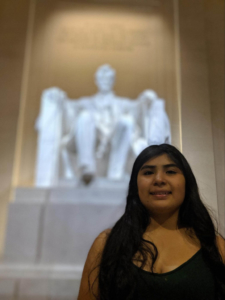
Eunice at the Lincoln Memorial.
“This past year, I’ve been a part of the Leadership Development class at The New America School in Thornton. My teacher, Zoraida Martinez, partnered with Protégete to teach us about environmental justice and civic engagement. We learned about how the impacts of climate change are made worse because of the waste that we create — a lot of which could be diverted by recycling or composting.
For example, when we throw plastic into the garbage, it can end up as harmful pollution in the ocean or contaminating the water and soil of our communities. Because plastic can’t biodegrade, it sits in landfills and contaminate the places where we live. That is why it is so important for everyone to do their part in protecting our planet.
I had never gotten involved in politics before; as an immigrant from Mexico, I didn’t think it was my place. But Ms. Martinez and Protégete helped me realize how powerful my classmates and I are.
And we were heard! I felt like I was putting my grain of sand in solving this huge problem, but I can’t do this alone.
That is why I went to DC to ask our federal representatives to hold polluting industries accountable. It is imperative for the government and factories to work together with regular people, like me, to stop climate change and keep Mother Earth safe.”
Eric, 22: An Exchange of Ideas
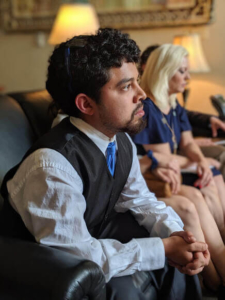
Eric in Senator Michael Bennet’s office, building a connection over attending the same school as Bennet’s daughter.
“Participating in the Rising Leaders training was a great experience. I had never been to Washington, D.C. before, and there were so many different things I was able to learn from that place, from how city infrastructure can impact our communities and our climate, to how important our stories truly are.
We frequently used public transportation (which I realized was cheaper and more efficient than our system in Denver) and discussed how communities and air quality can benefit from more public transit options.
The opportunity to learn about how important our voices are — and how we can use our stories to lobby our elected officials — was eye-opening. While I had visited the state Capitol in Colorado before, I didn’t fully understand the importance of personal stories and how they can illuminate why work needs to be done for everyone to live in an equitable world.
When we can tie these issues to ourselves — to real people, and even those who we are lobbying to — we better understand the gravity of the situation and know that we really do need to make changes.”
Our voices are what is going to shape how we solve the issues affecting us today. We shouldn’t be afraid to use our power to tell our elected officials to help us implement changes now.
Sara, 19: A Passion for the Future
“My passion for the environment is something that I have carried with me since I migrated to the United States from Colombia. It led me to a path of being what most people would call an “environmentalist:” recycling every piece of plastic and paper, turning off the lights in every room when they were not being used.
When I turned 15, I started volunteering with Protégete and learned that being an environmentalist meant so much more. I became aware of the environmental conditions in my community and those surrounding it were not what they needed to be: clean, healthy, and accessible. Such is the case for most communities of color and lower-income communities around our country. We have an obligation to these communities and others who are most impacted by environmental degradation to take care of our planet.

Sara sits outside Senator Bennet’s office.
The Rising Leaders and lobbying experience was extremely empowering. It constantly feels as if my community’s voice isn’t considered or heard when it comes to issues directly affecting us. But when I visited my elected officials to tell them why I am so passionate about these issues and what actions they can take to support my community, I was reminded how strong my community’s voice is.”
Although some of us can’t go to DC to lobby every day, we still have the power to make a change for the better. I hope that with this experience, I can motivate other young people to speak up so we can use our voices together to continue to tell our elected officials to take action to save our environment and people.
Taking part in this trip, including its trainings, and lobbying helped us realize that our voice is as strong as it could ever be, no matter how old we are or what limitations others impose on us. We can make a change in this world and we are the leaders of today. Encouraging the youth to be engaged in the issues that affect our community is essential, so just like us, they realize the importance their voice holds, and the power they have to advocate for themselves, and everyone else being silenced.
If you were inspired by our stories or if you would like to learn more about Protégete and Promotorxs programs, please click here or contact Patricia Ferrero at patricia@conservationco.org.

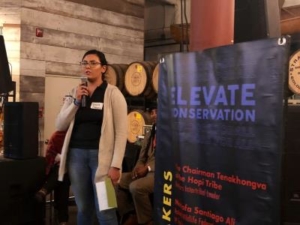
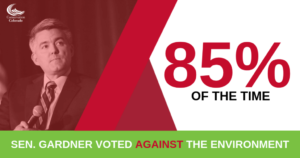 Senator Gardner has failed to fulfill his advertised commitments to renewable energy and the environment. Between 2015 and 2018 he voted against the environment
Senator Gardner has failed to fulfill his advertised commitments to renewable energy and the environment. Between 2015 and 2018 he voted against the environment 

